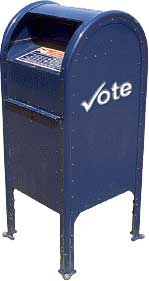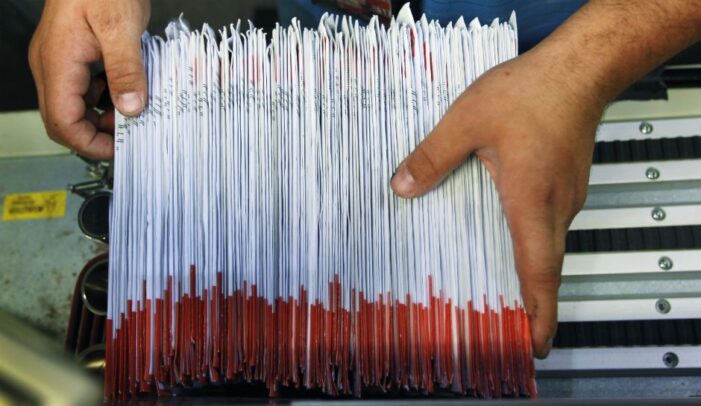UPDATED: There will be a press conference at the Miami-Dade Elections Department at 4 p.m. Wednesday to demand that the Supervisor of Elections count these ballots and request they “address valid voter suppression and ballot collection concerns” in time for the Nov. 3 election. Among those who will be present: P.U.L.S.E., South Florida National Action Network, Justice for Miami, Firefighters Union President Eric Johnson, The National African American Clergy Network, former Sen. Dwight Bullard, president of the South Dade Branch NAACP, South Dade Democratic Black Caucus Community Activist Chester Fair, State Rep. Dotie Joseph, Community Councilman Johnny Farias. And also the following candidates who lost their races by very close margins that could be affected by a recount: Olanike Adebayo, Sybrina Fulton, Marlon Hill, Jessica Laguerre Hylton, Nancy Lawther, Rhonda Rebman Lopez, Norman Whyte and Harold Ford.
More than 3,000 Miami-Dade voters did not have their votes in last week’s election count, after their absentee or vote-by-mail ballots arrived too late to the county Elections Department. More than 3,500  others had their ballots deemed invalid because they were missing signatures or the signature did not match the one on file.
others had their ballots deemed invalid because they were missing signatures or the signature did not match the one on file.
These are not voters who were turned away at their precincts because they found out too late that they could only turn their absentee ballots in at one of four precincts or the Elections Department headquarters in Doral. This was reportedly pretty widespread also. Some people drove to Doral. Some people took their chances and voted in person at their precincts. But we’ll never know how many decided not to drive to Doral and not to vote in person either.
No. These are 6,600 plus voters who went to the trouble of casting their ballots — for nothing.
A total of 3,172 ballots arrived the Wednesday, Thursday and Friday after Election Day, said Deputy Supervisor of Elections Suzy Trutie. By law, she said, those cannot be counted. Florida Statute 101.65  states: “In order to ensure that your vote-by-mail ballot will be counted, it should be completed and returned as soon as possible so that it can reach the supervisor of elections of the county in which your precinct is located no later than 7 p.m. on the day of the election.” Italics are mine, not theirs.
states: “In order to ensure that your vote-by-mail ballot will be counted, it should be completed and returned as soon as possible so that it can reach the supervisor of elections of the county in which your precinct is located no later than 7 p.m. on the day of the election.” Italics are mine, not theirs.
More than 5,100 ballots were rejected for signature “deficiencies” — either a missing signature on the envelope or a signature that did not match the one that the elections department has on file. But Trutie said that 1,443 who hadn’t signed the envelope and 151 whose signatures were questioned provided “cure affidavits” and additional signatures to the department. Those votes did count.
Read related: Few surprises and four runoffs in Miami-Dade commission races
The Miami-Dade County Elections Department takes every step possible to contact the voter as soon as the ballot issue is discovered so the voter has can correct the issue, Trutie said. “We send them a letter. We call them by phone. If we have a cell, we send them a text,” she told Ladra. “If we have an email address, we send them an email.”
“If we have an email address, we send them an email.”
By law, voters have until 5 p.m. on the second day after the election to “cure” any deficiencies.
It’s hard to believe that amid all the COVID-19-induced changes with ballot drop boxes and the record number of absentee ballots coming in that the elections department would have the staffing and time to contact 5,106 voters individually. But Catharine Skipp, a 66-year old Democrat who voted by mail for the first time because of the coronavirus pandemic, said she was one of them.
Skipp’s ballot was challenged, but she was given the time to correct it with a “cure affidavit” and she told the Associated Press that she was very impressed. “It felt very secure. [They’re] very on top of it,” she is quoted as saying. “They questioned my signature in an efficient way. And then I got an email that they had received my cure affidavit and everything was cool.”
But 3,512 voters did not provide cure affidavits — so their ballots don’t count, Trutie said.
That makes for at least 6,684 votes that were not tabulated. And there are plenty of races that were decided with margins far smaller.
Rhonda Rebman Lopez, who lost the House District 120 Republican primary race to Jim Mooney  by 149 votes, is not confident that the Monroe Elections Supervisor R. Joyce Griffin did enough to track down voters with signature issues. “No voter should ever be disenfranchised simply because the Supervisor of Elections did not make enough of an effort to verify the voter’s intent,” she said in a statement.
by 149 votes, is not confident that the Monroe Elections Supervisor R. Joyce Griffin did enough to track down voters with signature issues. “No voter should ever be disenfranchised simply because the Supervisor of Elections did not make enough of an effort to verify the voter’s intent,” she said in a statement.
Griffin told the Miami Herald last week that every effort was made to contact the voters. “The woman lost,” Griffin is quoted as saying. “For her to say I didn’t do due diligence is ridiculous.”
But Rebman Lopez said she was able to contact six Monroe voters in one day on Wednesday. “Well, I called them and they answered on the first, second, or third ring,” she told the Miami Herald. “I went to their house, and they came to the door, so, what’s up with that?”
Read related: Absentee ballots will be bigger than ever for elections in time of COVID19
Jessica Laguerre Hylton, who lost the State House District 117 Democratic primary to Kevin Chambliss by 221 votes, would also prefer to see all Miami-Dade ballots counted and told Ladra she was writing a letter Tuesday to the state and Miami-Dade Supervisor of Elections Christina White, who told the county commission Monday that the department would have more drop boxes available for mail-in ballots for the general election.
And guess what? They’re still counting votes because overseas voters in presidential years get more time. Their ballots must be postmarked or dated no later than the election date and received by the supervisor of elections no later than 10 days after the election, which means this Friday. If they are still counting votes until then, you’d think they could make an exception to the rules in the times of the COVID-19 pandemic and count these mailed in votes that could have been held up by the post office. You know, like they made a new rule allowing electeds more days to qualify for office.
They still can. And it would be better to err on the side that doesn’t disenfranchise 6,684 voters.

